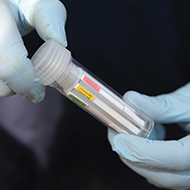
Vets highlight the importance of good husbandry to prevent infection.
A quarter of infectious scour cases in calves are likely to have been caused by a mix of disease organisms that are widespread in the UK farming environment, according to new research.
Data published by MSD Animal Health, gathered between October 2020 and March 2021, shows that 23 per cent of positive tests taken from UK calf rearing units had mixed infections.
Testing took place at 112 farms, using ScourCheck diagnositic kits, with 61 per cent of faecal samples from these units returning a positive result. The kits identified the presence of rotavirus, coronavirus, E.coli or cryptosporidium infections.
In light of the findings, vets are highlighting the importance of good husbandry to stop the disease from developing in the first place.
“Practically, this means making sure your cow colostrum is as good as it can be, in addition to ensuring good environmental hygiene and management,” explained MSD Animal Health livestock veterinary adviser, Dr Kat Baxter-Smith.
“Indeed, a good first step in terms of making your calf rearing enterprise more resilient to infectious scour problems is to give your dry cows a vaccine to boost dam colostrum quality pre-calving – and then feeding enough of this fortified feed to your newborn calves.”
Scour is a significant disease problem in young calves, especially during the winter, and is the most common cause of death in calves under two months of age.
According to Dr Baxter-Smith, calves are most at risk from infectious scours during the first one to four weeks of life, and they require the passive transfer of antibodies in the colostrum to help keep them healthy. On many units, however, normal colostrum may not provide enough antibodies.
“However, vaccination of the calf’s mother with Bovilis® Rotavec® Corona between 12 and 3 weeks before calving boosts colostrum quality, allowing you to feed high levels of antibodies against rotavirus, coronavirus and E.coli F5 (K99) in early life,” she said.
“To ensure this passive transfer of antibodies from the dam to calves, four litres of colostrum (or at least 10 per cent of calf body weight) containing 50g/litre of IgG antibodies should be fed within the first four hours of birth. This should be followed by two additional litres within 12 hours of birth.
“For calves left on the cow, getting four litres of colostrum requires approximately 20 minutes of continuous suckling.”



 The latest
The latest